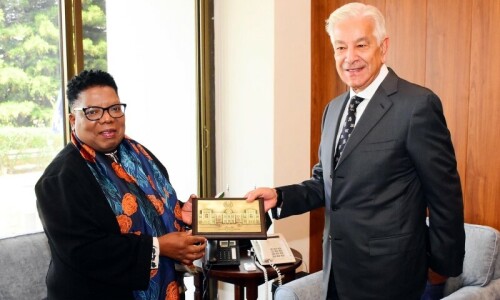ISLAMABAD: The Supreme Court on Wednesday asked the counsel representing Messers JDW Sugar Mills, owned by Pakistan Tehreek-i-Insaf leader and sugar tycoon Jahangir Khan Tareen, to present a proposal explaining how they planned to buy the entire sugarcane crop from farmers in their area at the government-assigned rate of Rs180 per maund.
Otherwise the court will consider allowing those sugar mills, whose operations were suspended on orders of the Lahore High Court (LHC) on Sept 11, 2017, to commence sugarcane crushing, Chief Justice Mian Saqib Nisar observed.
Mr Tareen was also asked to appear in court in person on Thursday before a three-judge Supreme Court bench that had taken up identical petitions filed by sugar mills — Haseeb Waqas Sugar Mills Ltd, Chaudhry Sugar Mills Ltd, Ittefaq Sugar Mills — and the Pakistan Kissan Ittehad, among others.
The LHC had ordered the petitioner sugar mills to shut down, dismantle and relocate their sugar plants from Bahawalpur within three-months.
Jahangir Tareen asked to appear before court today
However, the petitioners had argued that sugarcane crushing season, which lasted for three to four months a year, had already begun. They had added that missing out on the crushing season could cause irreparable loss to the petitioning companies and their employees, and would also adversely affect the farmers who supplied sugarcane.
They added that the government had banned enhancing and setting up new sugar mills in south Punjab areas, and the law did not extend to the relocation of existing sugar mills.
Representing Mr Tareen, senior counsel Chaudhry Aitzaz Ahsan told the court that he was a cultivator and would, therefore, not allow farmers to lose financially.
To this, the chief justice, in a lighter vein, asked whether counsel had paid his agriculture tax, and observed that the court was considering appointing a team, which Mr Ahsan could head, to collect the entire sugarcane crop, because the court would not allow farmers to suffer during the current sugarcane crushing season.
“I will continue to hold hearings in my chambers on a daily basis till the time the entire crop is purchased,” the chief justice observed, and said that the purchase of the crop would cost only Rs500 million or Rs1bn, which was nothing but peanuts for the client Mr Ahsan represented.
The court was told that sugarcane prices had plummeted from Rs180 to Rs50, but the court reiterated that it would not allow farmers to suffer.
The court wondered why there were appeals being published in newspapers, highlighting problems faced by sugarcane growers, when the mills had already been shut for almost a year.
The Supreme Court also accepted for hearing a petition filed by the Pakistan Kissan Ittehad (PKI) through Asma Jahangir pleading that LHC order striking down the Punjab Relocation Policy of Dec 4, 2015, had indirectly allowed the existing few sugar industries in south Punjab to create monopoly and benefit from unfair trade practices.
The LHC had failed to consider that crushing season must immediately begin by the end of November every year. Thus the high court’s order had deprived sugarcane growers of revenue.
The PKI argued that the high court order was also detrimental to the financial aspects of cultivating sugarcane, crushing and processing the crop, and was therefore harmful to national interest.
The judgement did not consider that farmers were able to cultivate a cash crop which enabled them to create a food basket in rural areas as well as contribute greatly to the economy of Pakistan and the rural areas, the PKI said.
The high court had strangulated the principle of competition within an industry, the PKI argued, adding that sugarcane growers would no longer have close proximity to sugar mills and would, therefore, be unable to collect the same profit afforded to other sugarcane growers in the area.
If farmers were forced to sell their crop at reduced rates to existing sugar mills in south Punjab they would suffer irreparable loss and injury, said the PKI.
Published in Dawn, January 11th, 2018














































